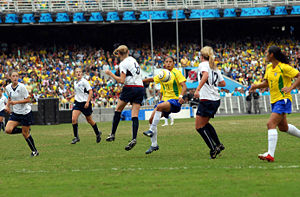The Women's Association Football Portal
Women's association football, more commonly known as women's football or women's soccer, is the team sport of association football played by women. It is played at the professional level in multiple countries, and 187 national teams participate internationally. The same rules, known as the Laws of the Game, are used for both women's and men's football.
After the "first golden age" of women's football occurred in the United Kingdom in the 1920s, with one match attracting over 50,000 spectators, The Football Association instituted a ban from 1921 to 1970 in England that disallowed women's football on the grounds used by its member clubs. In many other nations, female footballers faced similarly hostile treatment and bans by male-dominated organisations.
In the 1970s, international women's football tournaments were extremely popular, and the oldest surviving continental championship was founded, the AFC Women's Asian Cup. However, a woman did not speak at the FIFA Congress until 1986 (Ellen Wille). The FIFA Women's World Cup was first held in China in 1991 and has since become a major television event in many countries. (Full article...)
Selected article -

The UEFA Women's Champions League, previously called the UEFA Women's Cup (2001–2009), is a European women's association football competition. It involves the top club teams from countries affiliated with the European governing body UEFA.
The competition was first played in 2001–02 under the name UEFA Women's Cup, and renamed the Champions League for the 2009–10 edition. The most significant changes in 2009 were the inclusion of runners-up from the top eight ranked nations, a one-off final as opposed to the two-legged finals in previous years, and – until 2018 – playing the final in the same city as the men's UEFA Champions League final. In the 2021–22 season, the competition proper included a group stage for the first time in the Women's Champions League era. (Full article...)
Selected image

More did you know -
- ... that Ellyse Perry played both cricket and soccer for Australia at the age of sixteen? (20 February 2008)
- ... that the female footballer Bilgin Defterli decided to go to Germany because she saw no chance to play football in Turkey due to the dissolution of women's football leagues in 2003? (19 December 2013)
- ... that Trabzonspor were the first Turkish soccer team entitled to participate in the UEFA Women's Champions League? (19 September 2009)
- ... that the Djibouti women's national football team has played in only one FIFA recognised match, a 0–7 loss to Kenya in 2006? (25 April 2012)
- ... that despite FIFA recognition and twice-weekly training sessions, the Madagascar women's national football team has yet to play in a single FIFA-recognised match? (20 June 2012)
- ... that William & Mary women's soccer, coached by John Daly, is one of two NCAA Division I women's soccer programs that have never had a losing season? (26 July 2012)
Related portals
Did you know (auto-generated)

- ... that the Nike Phantom Luna football boot considers women's anatomy and the playing style of women's football in its design?
- ... that soccer player Danielle Marcano scored four goals in back-to-back games that helped to send the University of Tennessee to the NCAA tournament quarterfinals for the first time in history?
- ... that the 2012 Olympic women's soccer semifinal between the Canadian and the American national teams was called "the greatest knockout match in major-tournament football" since 1982?
- ... that despite being the first women's football team in Northern Ireland to sign players on professional contracts, Cliftonville Ladies F.C. were not the first club to register them?
- ... that horses were responsible for delaying the deciding match of the Barcelona women's football team's 1973 winning season?
- ... that first-team All-American soccer player Jordynn Dudley holds her high school's basketball scoring record?
General images -
Selected national team -
(Full article...)
Topics
Subcategories
Ways to contribute
- Join: Add your name to the members list of the Women's football taskforce
- Contribute: Check the Taskforce's Open task list and see if there's a task you would like to contribute to.
- Assess existing articles: (see WP:WPFA for assistance) or nominate some of our existing B-class articles for Good Article (GA) or Featured Article (FA) status
- Improve existing articles: Work on expanding articles in Category:Women's association football biography stubs with relevant content and citations
- Project Tagging: Tag the talk pages for any articles that are within the scope of this project with {{Football|Women = yes}} and {{WikiProject Women's sport}}.
- Translate: the page of clubs/players from corresponding articles in other language Wikipedia articles to English Wikipedia, if we have them as red links.
- Recruit: editors who have contributed to articles related to women's football
Associated Wikimedia
The following Wikimedia Foundation sister projects provide more on this subject:
-
Commons
Free media repository -
Wikibooks
Free textbooks and manuals -
Wikidata
Free knowledge base -
Wikinews
Free-content news -
Wikiquote
Collection of quotations -
Wikisource
Free-content library -
Wikiversity
Free learning tools -
Wiktionary
Dictionary and thesaurus











































